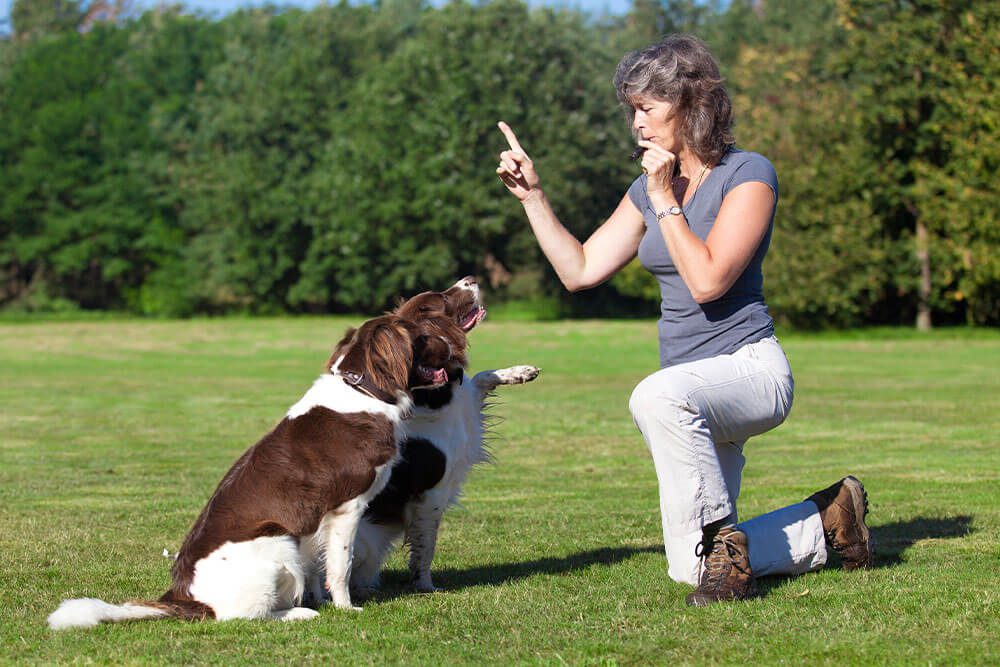How Do Dog Whistles Work?
Training dogs is not easy! When first looking up information on how to train your family puppy, it can be overwhelming. There are so many options for different devices and even more explanations on how to use or how to not use them. One of the oldest training devices used in dogs is the dog whistle.
These dog whistles are commonly used in Sheepherding dogs that compete in national dog competitions or work on farms helping their owners. While this is the case, some pet owners use whistles to train their dog’s new tricks or deter them from other dogs or people.

What Are Dog Whistles?
Dog whistles are whistles used to train dogs. These whistles are hard to hear for humans. Dogs, like cats and many other animals, have stronger ears and can hear up to 45 Hz. To better explain why this is such a high number, humans can only hear up until 23 or 24 Hz. Sometimes, humans can hear past these high frequencies, but it hurts their ears, and those who can are a minority.
Dog whistles have an interesting history. These small whistles have been around for centuries and were first created and used for hunting. Dogs used as herding dogs or hunting were trained by their owners to hear the whistle and respond.
So why make them silent to humans and other animals? Humans hunt animals for food and need to be stealthy about it as animals like deer and bears are fast and have excellent hearing. If pet owners use their canine friends to help hunt, they need to not scare away the animals as well. The dog whistle blows at a frequency that only dogs can hear, which means that dear isn’t afraid of the sound if they hear it at all. Instead, it commands the dogs to go hunt.
What Are the Benefits of Using a Dog Whistle?
There are many benefits that come with using a dog whistle. The benefits are listed below.
No Sound Means No Disturbances
Since dog whistles are, for the most part, silent for humans, they do not cause disturbances. It is hard to train dogs when you live in quiet communities such as apartments or condominiums. Since regular whistles that we use on humans are loud and echo, everyone can hear them, including humans. Dog whistles, however, are relatively silent except for a short and muffled whistling sound to humans.
Training for Commands
Some dogs respond well to dog whistles because they can learn short commands from them. This benefit is great when you let your dog roam around but want them to come back. However, for your dog to learn the command and how to respond to it in a timely manner, you must train using repetition and rewards.
When training your dog to listen to commands through the dog whistle, you can give them a treat every time you blow the whistle, and they come back. You do need to be consistent, though. If you give your dog treats even when they don’t listen to you, they are less likely to actually remember the command.
Whistling to Stop
Another benefit of having a dog whistle and using it is you can potentially stop accidents. For example, in dog parks, not all dogs are trained. Although all dogs are supposed to be trained, accidents and fights can still break out, especially with conflicting personalities. If you notice that your dog is getting aggressive, with their hair raised, you may want to blow the whistle for them to stop.
Although your dog may not know what the dog whistle means, the noise can surprise them and stop them from the altercation. This is a safer way to get involved compared to stepping in between two large dogs.
What Are the Consequences of Using a Dog Whistle?
Just like there are benefits to using a dog whistle, there are also consequences and negative aspects to it. It is important to understand that not all dogs respond well the whistles. The loud, high-pitched frequency may not be pleasant and cause discomfort as opposed to pleasure. The ways you should not use dog whistles are:
Using It Frequently
You should not use a dog whistle frequently. They should only be used for commands once in a while. If you abuse the dog whistle, the meaning gets lost, and your dog will become used to the sound, which ultimately defeats the purpose.
Directly in Your Dog’s Ears
Never blow a whistle into your dogs’ ears directly! You should always be a distance away from them. Dog whistles are already loud, so loud we cannot hear them. Our furry friends can develop damaged eardrums and discomfort if we blow the whistle close to them. Imagine if someone blew a whistle in your ear. Would you like that?
Are Dog Whistles a Good Thing for Your Dog?
This is a tricky question! Not all dogs enjoy or can be trained using dog whistles. For example, dogs that are skittish and have come from traumatic situations should not be forced to hear a dog whistle. The loud noise could cause further issues and hurt them in the long run.
However, if you live on a large property and want to make sure that your dog comes home, a dog whistle may be the right choice for you. Always try it first once before making the decision to train them using the device alone.
If You Aren’t Too Sure About Dog Whistles, Reach Out to Us
In conclusion, dog whistles can be both beneficial and harmful for your dog. Dog whistles work by blowing hot air into a whistle that provides a sound at a high enough frequency that only dogs and some other animals can hear. There are various types of dog whistles, but they all have the same purpose; to train and teach your dog something new.
If these dog whistles are not used properly, they can cause damage, especially if you have a dog that is already skittish and afraid.
Our Schertz, TX, veterinarians are more than happy to answer any dog whistle questions during your dog’s next vet visit. Give us a call at (210) 659-0345 to schedule your canine’s appointment with us.
Share This Article
About
Schertz Animal Hospital
Since 1976, Schertz Animal Hospital has offered the greater San Antonio area outstanding pet care. Our state-of-the-art animal hospital in Schertz, TX compliments our stress-free handling and experienced veterinary staff. Make an appointment online or give us a call at (210) 659-0345 today!
